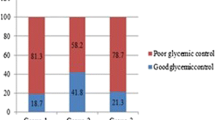Abstract
In the clinical setting, the impact of educational efforts on the amount of regular exercise and its effects on diabetes control are unclear. Fifty type 1 diabetic, 50 type 2 diabetic and 70 non-diabetic subjects were evaluated using a questionnaire for type, duration and intensity of exercise to assess weekly energy expenditure. Diabetic subjects did not exercise more than controls: 36% of the type 1, 46% of the type 2 and 46% of the control subjects admitted no physical activity, and those exercising regularly had similar energy expenditure: 1808±320, 2722±617, 2523±304 (mean±SEM) kcal/week respectively (P=NS). There was no correlation between the degree of activity and HbA1c levels, or hypoglycaemic events. HbA1c levels were less than 6,8% in 31% of non-active active patients versus 21% of active patients (P=NS). A negative correlation was found between physical activity and daily insulin usage (r=0.27,P<0.05), but differences between patients averaged only 4 IU/1000 kcal energy expenditure/day. We conclude that patients' attitude towards exercise was not improved by our educational methods and that physical exercise was not necessarily associated with good blood glucose control.
Similar content being viewed by others
References
Lawrence RD, The effect of exercise on insulin action in diabetes. BMJ 1:648–652, 1926
Marble A, Smith RM, Exercise in diabetes mellitus. Arch Intern Med 58:577–588, 1936
Horton ES, Devlin JT, Exercise and non-insulin-dependent diabetes mellitus. In: Alberti KGMM, Mazze R, (eds) Frontiers of diabetes research: current trends in non-insulin-dependent diabetes mellitus. Elsevier, Amsterdam pp 271–284, 1989
Ruderman NB, Ganda OP, Johnson K, The effect of physical training on glucose tolerance and plasma lipids in maturity-onset diabetes. Diabetes 28 [Suppl 1]:89–92, 1979
Saltin B, Lingarde BS, Jouston M, Horlin R, Nygaard E, Gad P, Physical training and glucose tolerance in middle-age men. Diabetes, 28:30–32, 1979
Wallberg-Henriksson H, Gunnarsson R, Henriksson J, De-Fronzo RA, Felig P, Ostran J, Wahren J, Increased peripheral insulin sensitivity and muscle mitochondrial enzymes but unchanged blood glucose control in type 1 diabetics after physical training. Diabetes 31:1044–1050, 1982
Caron D, Poussier P, Marliss EB, Zinman B, The effect of postprandial exercise on meal-related intolerance in insulin-dependent diabetic individuals. Diabetes Care 5:364–369, 1982
Zinman B, Zuniga-Guajardo S, Kelly D, Comparison of the acute and long-term effects of exercise on glucose control in type 1 diabetes. Diabetes Care 7:515–519, 1984
Katch FI, McArdle WD, Energy expenditure in household, recreational, and sport activities (in kcal per min). In: Katch FI, McArdle WD (eds) Nutrition weight control and exercise. Lea & Febiger, Philadelphia, pp 268–277, 1988
Goldgewicht C, Slama G, Papoz L, Tchobroutsky G, Hypoglycaemic reactions in 172 type 1 (insulin-dependent) diabetic patients. Diabetologia 24:95–99, 1983
Rubin RR, Peyrot M, Saudek CD, Differential effect of diabetes education on self-regulation and lifestyle behavior. Diabetes Care 14:335–338, 1991
Author information
Authors and Affiliations
Rights and permissions
About this article
Cite this article
Selam, J.L., Casassus, P., Bruzzo, F. et al. Exercise is not associated with better diabetes control in type 1 and type 2 diabetic subjects. Acta Diabetol 29, 11–13 (1992). https://doi.org/10.1007/BF00572822
Issue Date:
DOI: https://doi.org/10.1007/BF00572822




